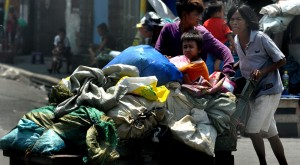Government’s ‘to-do’ list remains long

In the weeks leading up to the 2010 elections, the campaign of then senator Benigno Aquino III, in an attempt to hold on to its shrinking lead in the polls, included a series of TV ads that proclaimed “Kung Walang Corrupt, Walang Mahirap.” In May that year, 15 million people rallied behind this battle cry to sweep the son of the late Corazon Aquino to the presidency.
Four years later, three senators and President Aquino’s own predecessor, Gloria Macapagal-Arroyo, are in government custody awaiting trial on various corruption charges. Eradicating poverty, however, has proven to be more difficult. “Most of the gains so far have been qualitative,” said Victor Abola, professor of economics at the University of Asia and the Pacific.
Amid talks of a supposed “economic miracle,” referring to the Philippines’ new near-spotless image on the world stage, Abola said the government’s work was far from done. While growth numbers have risen, statistics have not translated into tangible improvements in the lives of average Filipinos.
Last year, the Philippine economy grew by 7.2 percent, the fastest among major Southeast Asian members, and second-best in Asia, next only to the continent’s behemoth, China.
Key metrics that more accurately measure the plight of the Filipinos, however, tell a grimmer story.
Latest official data showed unemployment stayed at 7 percent at the end of April this year. Although better than the 7.6 percent the year before, the ranks of the jobless remained among the highest in the region.
“Employment grew half as fast as GDP in 2013—a robust rate but less than needed to absorb the nearly one million labor force entrants each year,” said Shanaka Jayaneth Peiris, the International Monetary Fund’s resident representative in Manila.
Four years into the Aquino administration, poverty levels have also started to moderate, although at a pace slower than policymakers had wanted.
Latest data showed that at the end of June 2013, a quarter or 24.9 percent of Filipinos were still considered poor. This was down from 27.9 percent of Filipinos below the poverty line in the same period the year before. At this rate, the country’s commitment to cut poverty in half to 16.6 percent by the 2015 deadline will most likely be missed.
“Sustained job growth is needed to help break the cycle of poverty and high unemployment,” he said.
What the government has achieved, apart from its prominent steps to curb corruption, was the improvement in the state’s fiscal standing, which meant more resources were now available for publicly funded projects, Peiris said.
Through improved tax and customs collections, the government has been able to increase spending on infrastructure while keeping its fiscal deficit below the ceiling of 2 percent of gross domestic product (GDP). Investment-grade ratings won in 2013 have also led to lower borrowing costs, freeing up even more resources for the state.
By 2016, the government plans to spend the equivalent of 5 percent of GDP on infrastructure or double the rate in 2010.
Gains in transparency and the reduction of red tape have also made the Philippines a better place to do business in. The Philippines has advanced 28 places since 2009 (to 59th position) in the World Economic Forum’s Global Competitiveness Rankings.
With 2016 looming in the horizon—and with it, politicians already making their bets—the administration’s list of things to do remains long.
To achieve the authorities’ ambitious—though appropriate—planned increase in infrastructure and social spending, a significant increase in structural revenue would be needed, Peiris said.
Mobilizing the needed revenues, Peiris said, should rely primarily on broadening the tax base by reducing corporate income tax holidays and further improving tax administration.
The proposed amendments to the Build-Operate-Transfer law that give the national government additional powers in the case of public-private partnership (PPP) projects should also be on top of the Aquino-controlled Congress once sessions resume this week.
He said this should make it easier for the state to acquire land for big-ticket projects, which could relieve some regulatory uncertainty for investors and accelerate project execution.
Making the country more business-friendly should also be a priority. “A second wave of structural reforms that reduce the costs of doing business… can bring in new sources of growth and employment,” Peiris told the Inquirer in an interview.
This should be done by relaxing limits on foreign ownership, creating a comprehensive competition law that establishes an independent fair trade commission, and further cutting red tape, specifically in the power and other business start-ups.
Another constraint to business activity, Peiris said, was the country’s rigid labor law that included high firing costs and strict limits on apprenticeships and fixedterm contracts.
He said these regulations disproportionately burden small enterprises, hindering business expansion and job creation.
Granting individual ownership titles to small land parcels would allow land to be used as collateral to back business loans, Peiris said. Meanwhile, building farm-to-market roads and increasing competition on inter-island shipping would lower transport costs.
“Tangible results have been achieved but further structural reforms are needed to sustain faster and more inclusive growth,” Peiris said, and with two years to go, there’s no time left to lose.
